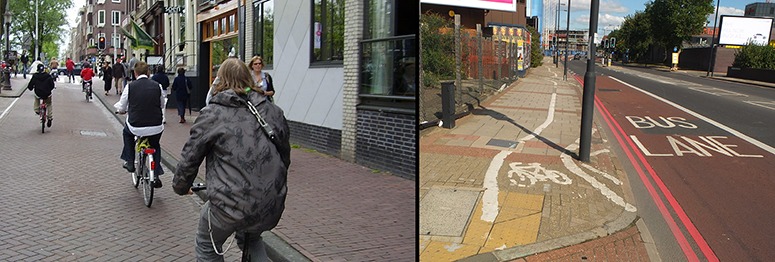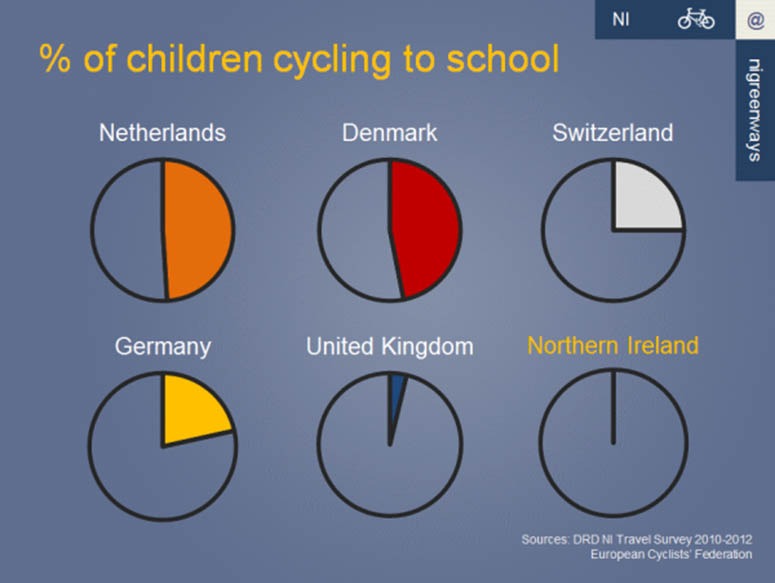Here is a video of the recent Stop Killing Cyclists protest march in Oxford Street. It was very well organised, with a theatrical dash, but did not get the media coverage it deserved. There was a massive police escort. The officers were very friendly to the marchers but I wonder if the relationship has become too cosy. The police would not have liked it but we might have achieved more if the die-in had taken place in Oxford Circus and if we had waited for the police to remove each and every demonstrator in a police van.
Category Archives: Cycle planning
Cycle infrastructure expenditure in the UK and Holland
- The UK spends £2/person/year on cycling
- Holland spends £24/person/year.
- So Holland has better cycling infrastructure.
- The Dutch spend ten times as much on cycling as the British and they have ten times as many urban journeys/person (30%+ vs 3%+)
- It figures
To make up for years of neglect, the UK should spend £50/person/year on cycling. When UK cycling infrastructure is as good as Holland’s, this can drop back to £25/year.
Just think, about this quotation from a Sky report on The British Cycling Economy.
The proportion of GDP spent on public infrastructure by the UK Government has been lower than government spending in many other countries, averaging around 1.5 per cent between 2000–2004 – around half of the investment occurring by governments in Italy and France. Despite rail accounting for only six per cent of total passengers in the UK, the sector received a subsidy of around £6.5b, almost equalling road investment, which carries the majority of journeys undertaken in the country. In addition, tax revenues from transport eclipse expenditure on transport by £14b, reflecting a net flow out of the sector from receipts. Cycling’s proportion of the UK transport budget is less than one per cent, whilst in the City of London, one of the UK’s larger cycling ‘hot spots’, cycling has been apportioned 0.45 per cent of the £135m transport budget, amounting to around £600,000.54 Currently, 10,000–15,000 cyclists commute into the Capital each day, which has increased by 52 per cent since 2007, and is forecast to quadruple by 2025.55 These macro and micro conditions continue to create the ideal milieu for cycling participation to increase across social strata, with significant benefits.
The landscape architecture of greenways and cycling to school and to everywhere
Congratulations to Northern Ireland Greenways for a super set of infographics (+ thanks for permission to reproduce the above pic). Of the chosen countries, why does the UK have the lowest figures for cycling to school? Does the UK have colder weather and higher mountains than Switzerland? Is it windier than Denmark and Holland? Is the UK’s GDP so much higher than Germany’s that we all have big cars? Or is the UK governed by blockheads who prefer cars to bikes and therefore employ legions of highwaymen and hardly any landscape architects to plan the country’s transport infrastructure? I incline to the last of these explanations – but we have a Mayor of London and a Prime Minister who are both keen cyclists. So there may be another explanation: the UK has over-strong central government and lapdog local government. The Whitehall bullies and barons keep asking themselves ‘What does THE COUNTRY need?’, Nobody can take locally relevant decisions to benefit local people. Switzerland has the best system for subsidiarity and local decision making. My guess is that were it not for those pesky Alps and snowdrifts it would have the best cycle infrastructure in Europe.
How to plan a cycling protest demo – the POP Pedal on Parliament 2014 event in Edinburgh
It is good to have
– scenic drama, with the route planned by a landscape architect
– emotional music, planned by a musical director and extending along the whole route
– a persuasive narrative, with speeches by children, activists and politicians
– good co-opration from the police
– jokes, fun and glamour
– good supporting information on a website, with facts, figures and international comparisons
And it’s good to reflect that ‘Power must be taken, it is never given’. (William Powell)
The 2013 London bicycle die-in was good on music and drama but not so good on speeches.
The 2014 POP Pedal On Parliament in Edinburgh was good in all respects.
Another Stop Killing Cyclists event in London – to give a petition to the Mayor's advisor
Holding a box containing the signatures of 36,795 Londoners, including mine, Mayor Boris Johnson’s Cycling Advisor, Andrew Gilligan, states on this video that ‘I think we more or less agree about policy. The only disagreement is about timing’. WELL: if he was speaking to me then he agrees that cycling should receive 35% of London’s transport for at least the next decade, or until the percentage of journeys done by bike increases from 2% to 35%. At present cycling receives 2% of the TfL budget. So my comments are:
Whoopee!
Thank you very much Mr Gilligan!
London cycling die-in protest outside TfL offices on 29th November 2013
I have been hoping for a protest like this for years and was delighted to be there. Here is my next suggestion: Transport for London TfL should set a target for the percentage of journeys to be made by cycling and then (1) raise the percentage of the transport spent on cycling to that level eg 30% (2) ensure that the same percentage of TfL staff commute to the TfL office by bike.
Here is an excellent BBC news report on the demo in which Donnachadh McCarthy an organiser of the Stop Killing Cyclists Campaign, calls for 10% of the TfL budget to go on cycling (compared to 35% in Holland) and makes the excellent point that the Board of TfL is ‘big businessmen’ – with no representatives of pedestrians or cyclists. I see this as a key point. It is likely that TfL staff often cycle to work and support cycling. This is less likely to be the case for big businessmen.
Boris: please remember that you are the only politician I have voted for who has ever been elected: now is the time to come good: organise a London Cycling Summit and cram the board of TfL with die-hard cyclists. Please re-read the history of Lloyd George’s victory over the House of Lords. He asked “Should 500 men, ordinary men, chosen accidentally from among the unemployed, override the judgement – the deliberate judgement – of millions of people who are engaged in the industry which makes the wealth of the country?” The 1911 Parliament Act was passed only when King George V said he was willing to pack the House of Lords with Liberal peers to ensure the vote would swing their way. Bring on the cyclists.
The November 2013 event could be a great precursor for a full-scale event in The Mall in 2014, remembering Martin Luther King and the March on Washington of August 28, 1963. The 2014 event should be on the same weekend as another London cycling event eg the Prudential Ride on Sunday 10 August 2014. It is part of the Mayor of London’s annual festival of cycling.


